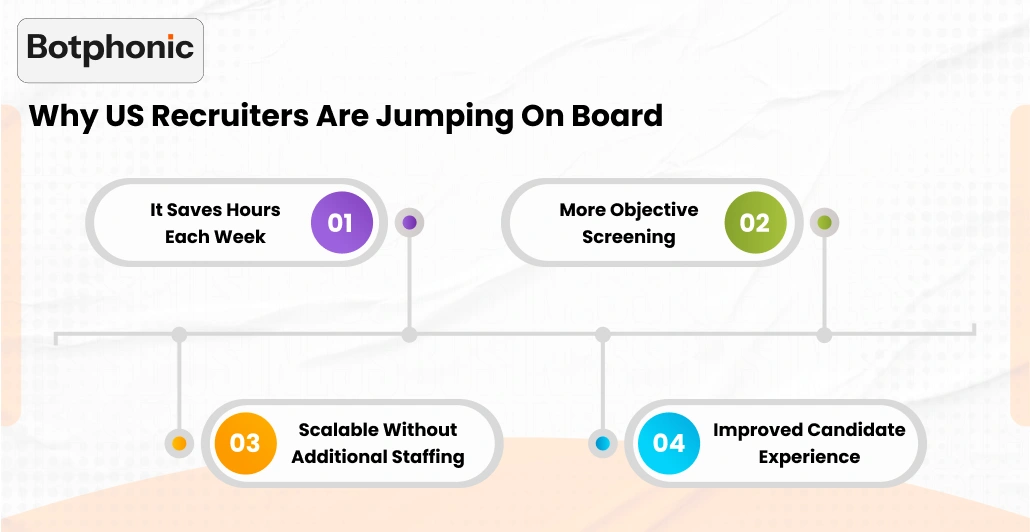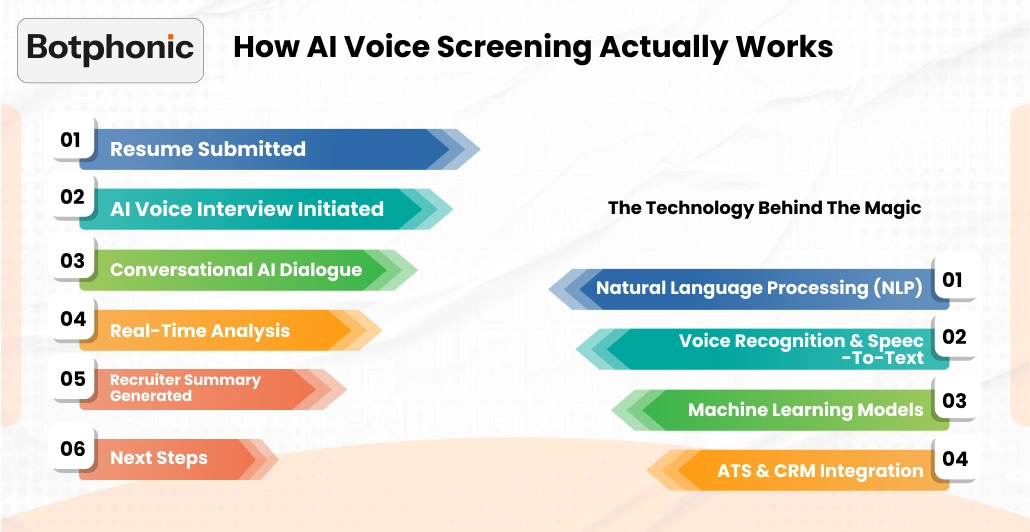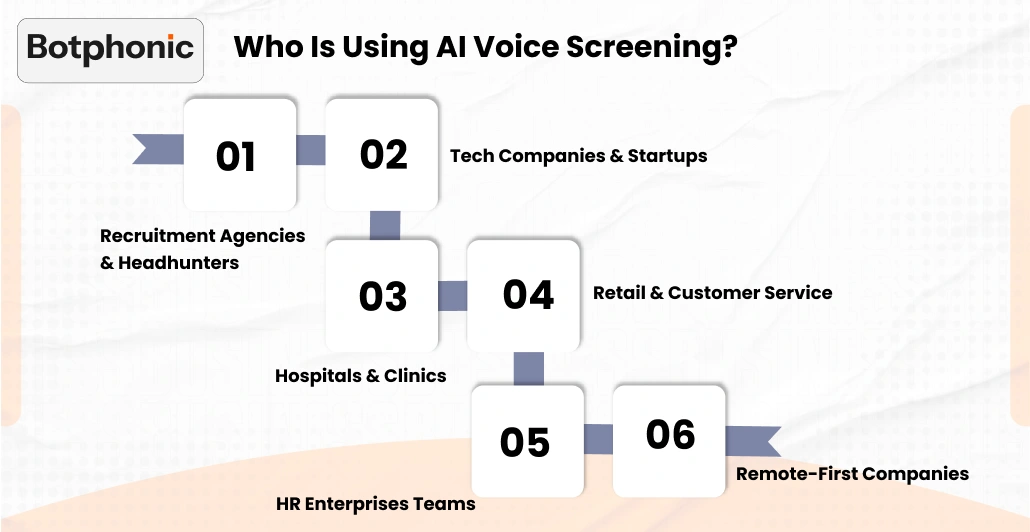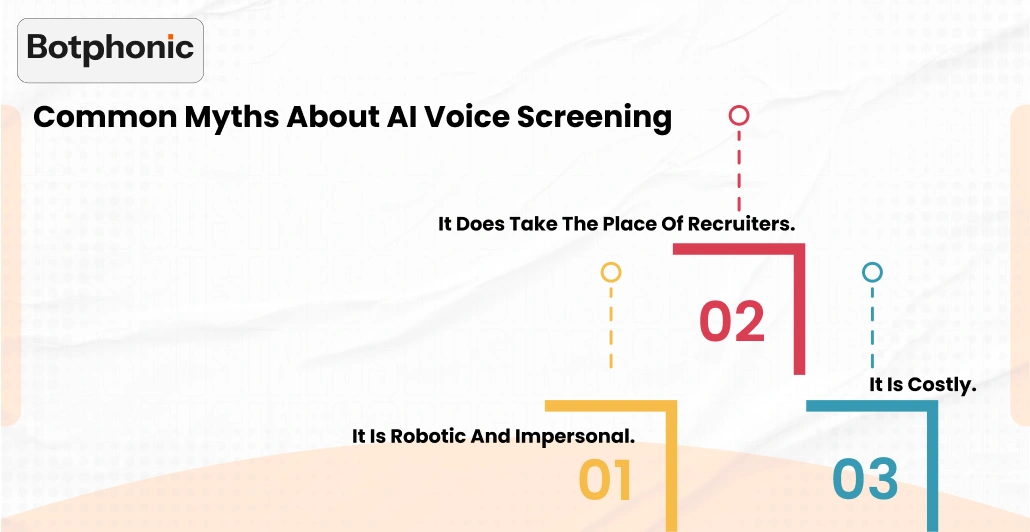
Summarize Content With:
Summary
Artificial intelligence (AI) voice screening and AI call assistants are transforming the candidate screening efforts of US recruiters. This blog discusses how they are saving recruiters time, minimising bias, and enhancing hiring outcomes. It also cites practical advantages, applications and why this technology is becoming necessary in contemporary staffing.
Introduction
You waste hours of your week tracking candidates, setting up phone interview times, and asking screening questions repeatedly, yet still struggle to find an employee in time. You are overworked, but your talent pipeline is slow.
Sound familiar?
That is the kind of routine that most US recruiters are going through, and this applies more so in the current frantic hiring we practice, where the clock never stops. The modern screening model, based on phone calls, not only takes a long time but is also more susceptible to bias, inconsistency, and burnout.
That is why, instead of wasting their time on these bleary-eyed initial conversations, more and more recruiters are embracing AI voice screening, which uses an AI call assistant to do all that tedious, repetitive work of early chats, sifting through resumes and giving you focused summaries so you can recruit quicker and smarter.
This is not merely an issue of efficiency but also about being competitive in a job market where the best talents are in high demand and never patient. So, why are US recruiters switching, and what changes can be expected in the future of hiring as a result?
What is AI Voice Screening?
Let’s simplify it: AI voice screening is the use of artificial intelligence to conduct phone or voice interviews with candidates. Rather than a human recruiter asking the questions and then jotting down notes, an AI-powered voice assistant handles the interaction.
This is not a typical robotic voicemail voice either. We are talking about conversational voice AI that sounds natural and has intelligent response processing, even to the extent of analysing tone, sentiment, and clarity. Think of it as your avatar assistant that can talk, listen, analyse, and summarise, all in real time.
The AI voice assistant is not simply reading from a script. It is programmed to understand the conversation flow and engage in meaningful dialogue with job candidates.
Why US Recruiters Are Jumping On Board

Let’s face it, recruitment is a tough job. You’re under constant pressure to fill roles quickly and cost-effectively. Here’s how AI voice screening helps recruiters do just that:
1. It Saves Hours Each Week
Think of doing away with the manual job of scheduling and carrying out preliminary phone screens. It is done by AI 24/7, even during weekends. Applicants are allowed to answer at their convenience, and recruiters will receive a detailed summary following every interaction.
As SHRM indicates in one of its reports, it takes an average of 36 days to fill a gap. It is too long a cycle when you want to scale. AI voice screening makes this less by helping to automate the first point of contact.
2. More Objective Screening
In old-school interviews, unconscious bias is a significant issue. One can hire or not hire, possibly depending on the candidate’s voice, accent, or even their name, whether unconsciously or sometimes consciously. However, AI eliminates much of this subjectivity by processing answers against preset criteria rather than relying on human assumptions.
In the process, it also opens up the hiring method to diversity and inclusivity, something highly sought after by top talent.
3. Scalable Without Additional Staffing
Whether you’re working to fill three positions or 300, the AI recruiting tools will scale with your company. Therefore, there is no need to hire additional personnel during peak periods. The AI recruiter never sleeps and can process thousands of screenings simultaneously.
Such a feature is especially useful for recruitment firms or startups that are growing fast and utilising AI hiring platforms to fill roles at scale.
4. Improved Candidate Experience
People do not like to keep somebody waiting. A candidate who applies to a position on a particular day will not want to wait for a week to get an interview call. Thanks to AI recruitment, responses appear on the screen instantly, while candidates interact with a voice assistant AI immediately after submitting their resume.
The quick feedback mechanism can enhance two-way engagement and greatly decrease dropout rates, a huge pain point for recruiters.
A Quick Comparison
| Traditional Screening | AI Voice Screening |
| Manual and time-consuming | Automated and efficient |
| High chance of bias | Objective and data-driven |
| Limited scalability | Unlimited screening volume |
| Scheduling headaches | 24/7 availability |
| Inconsistent notes | Clear summaries & insights |
How AI Voice Screening Actually Works

In general, this is how it fits into the hiring funnel:
1. Resume Submitted
An applicant uploads a resume, which can be combined with the resume screening AI to filter applicants based on qualifications.
2. AI Voice Interview Initiated
The applicant gets prompted to begin a voice interview from a phone or a browser.
3. Conversational AI Dialogue
A voice assistant powered by AI conducts a structured conversation, asking role-specific questions.
4. Real-Time Analysis
In this phase, important data is captured for analysis: tone, keywords, pauses, confidence, and relevance of answers.
5. Recruiter Summary Generated
The system generates a detailed report and feedback, including a sentiment score and transcript.
6. Next Steps
Recruiters can move candidates forward based on data analysis rather than relying on intuition.
This combination of free AI speech-to-text, sentiment detection, and automated scoring speeds the entire process of prioritising the best candidates.
The Technology Behind the Magic
Some tech stack components include the following in AI voice screening:
1. Natural Language Processing (NLP)
This enables AI to understand and speak naturally.
2. Voice Recognition & Speech-To-Text
It converts the speech into text for further analysis.
3. Machine Learning Models
These improve over time, based on feedback from thousands of conversations, to sharpen their accuracy.
4. ATS & CRM Integration
Top AI recruiting companies sell integration technologies for popular platforms, including Greenhouse, Lever, and Workday.
According to LinkedIn’s Future of Recruiting 2025 report, 73% of talent acquisition professionals agree that AI will change the way organisations hire.
That change is already underway, especially in industries with high-volume operations such as healthcare, retail, and technology, where speed is as important as precision.
Who Is Using AI Voice Screening?
The once high-tech experiment now lends itself to realistic applications in several industrial and business setups in the United States, accelerating, smartening, and metabolising dextrously. Here’s the front row:

1. Recruitment Agencies & Headhunters
Some of the very early adopters have been staffing agencies and AI headhunters. Often working in-house on high volumes of candidate data, they need to screen candidates quickly for multiple clients. Here, an AI call assistant can perform the initial interview, allowing the team to dedicate time to actual talent.
2. Tech Companies & Startups
The rapid-growth startups and tech companies love scalable tools. They use AI recruiting tools to quickly find, screen, and hire developers, marketers, and product teams. Today, such companies maintain AI voice assistant to accelerate lean and data-driven recruitment.
3. Hospitals & Clinics
Hospitals, clinics, and medical staffing agencies have utilised AI voice screening systems to filter their nurses, assistants, and technicians, particularly for large-scale hiring. An AI call assistant can screen candidates with 24/7 availability options available to recruiters, including those working night shifts and weekends.
4. Retail & Customer Service
Retail chains and BPOs should outsource staff in bulk. When it comes to hundreds of candidates, it is simply not feasible to use manual screening. The AI-enabled recruiting process enables them to screen a high number of candidates in a short time without expanding the HR department.
5. HR Enterprises Teams
Bigger companies with their recruitment teams are incorporating AI voice or AI recruiting into their HR suites in general. The tools are used in parallel with the ATS platforms, allowing HR teams to automatically screen candidates and complete all their work within a single platform.
6. Remote-First Companies
Firms with a remote model hire workers who are consistent throughout time zones, utilising AI voice recruiters for filtering. AI call assistants can operate 24/7, helping to screen candidates from anywhere in the world without creating scheduling conflicts.
Common Myths About AI Voice Screening

1. It is robotic and impersonal.
Conversational voice AI is made to be natural and intone various sounds and accents. The applicants do not even notice they are talking to a robot.
2. It does take the place of recruiters.
Wrong. It improves their output. Hiring still requires the skills of human recruiters in decision-making, coaching and negotiation. The AI simply screens off the noise.
3. It is costly.
The majority of AI hiring platforms are currently available on a pay-per-use or subscription basis. And they usually have a very high ROI, considering the time saved, even in cases where you have a small team.
It’s Not Just About Screening: It’s About Strategy
Although AI voice screening exists at the top of the funnel, it is linked to wider AI-driven candidate sourcing. You can combine it with AI sourcing tools that sweep the web to find talent or use AI to screen the CV to sort out resumes before the interview has even started.
It is an element of a full-stack strategy, saving time, enhancing the quality of hire, and making the overall process more pleasant for the involved parties.
Final Thoughts: It is Time to Have AI Take the First Call
The recruitment world is evolving rapidly—and conventional ways can no longer cut it. Hiring great hires is being stagnated by manual phone screens, scheduling insanity and response latency. When you continue to use old processes, you are not only wasting precious time but also letting go of the best employees to the quicker-moving competitors.
One of our tenets of AI Voice Screening, which drives our intelligent AI-based call assistants, is smart and faster contact with candidates. It assists recruiters in automating their routine work, preventing bias, and making higher-quality hires, all without compromising the human element. So, no matter whether you are a one-man recruiting operation or you have a huge talent acquisition department, now is the time to adopt technology to your advantage as opposed to working against you.
Are you searching for the best AI recruiting tools, scalable artificial intelligence hiring solutions, or even artificial intelligence recruiting solutions that work in the real world? Then it’s time to give something created and built to solve today’s hiring challenges a test.
Get full control of your own recruiting cycle through one of the most trusted and simplest-to-use recruiting AI software tools available.
Take your first step towards hiring smarter with Botphonic, the one-stop shop AI hiring solution that can save you time, bring a better candidate experience, and help you create stronger, faster teams.

